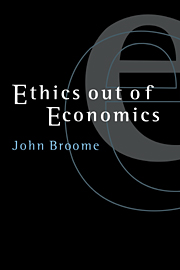3 - Extended preferences
Published online by Cambridge University Press: 12 November 2009
Summary
Introduction
Many economists have adopted a doctrine known as ‘ordinalism’. Ordinalism insists that we can know about people's good only by means of our knowledge of people's preferences. Many ordinalists believe their doctrine implies that we cannot know how one person's good compares with another's. But some have resisted this conclusion; they have argued that we can make interpersonal comparisons of good in a way that is consistent with ordinalism. They think a particular class of preferences can constitute a basis for comparisons between the good of different people. They have in mind people's preferences between very widely defined alternatives, each of which consists of a way of life together with the personal characteristics of a person who lives that life. These are called ‘extended preferences’. This chapter reveals a flaw in the argument that extended preferences can be a basis for interpersonal comparisons of good. It shows that interpersonal comparisons really are inconsistent with ordinalism.
Section 3.2 of this chapter explains ordinalism in more detail. Section 3.3 describes the notion of extended preferences, and specifies a condition extended preferences must satisfy if they are to serve the purpose they are meant for: everyone must have the same extended preferences. Section 3.4 quotes an argument of John Harsanyi's that is intended to show everyone will indeed have the same extended preferences. Section 3.5 explains that Harsanyi's argument contains an error.
There is an alternative approach to interpersonal comparisons implicit in some ordinalist writings, including Harsanyi's. This second approach is not usually clearly distinguished from the approach through extended preferences, but actually it does not depend on extended preferences. Section 3.6 describes it. Section 3.7, however, shows it is inconsistent with ordinalism.
- Type
- Chapter
- Information
- Ethics out of Economics , pp. 29 - 43Publisher: Cambridge University PressPrint publication year: 1999
- 3
- Cited by



